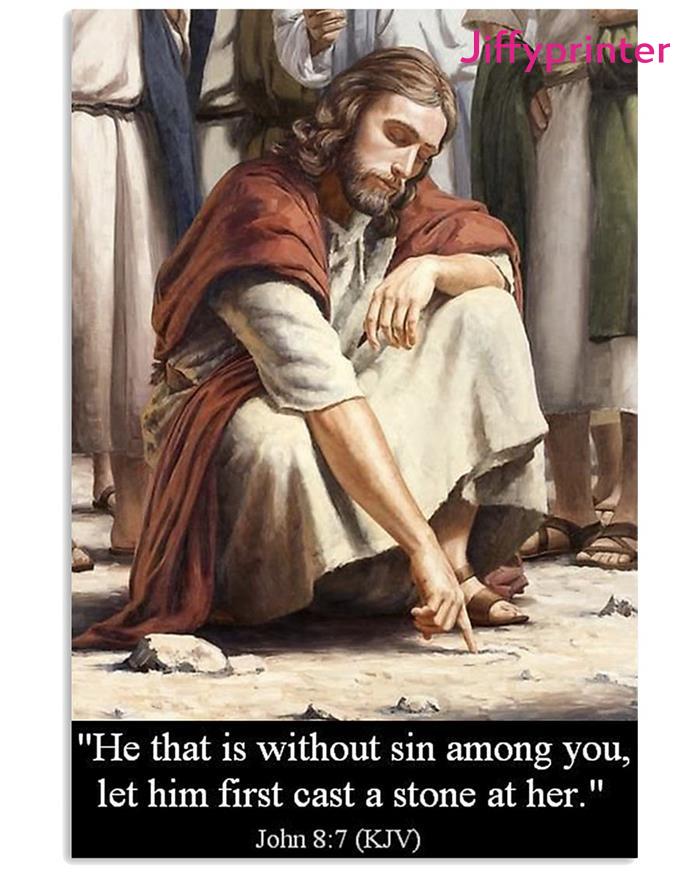
Let him who is without sin cast the first stone
According to the Gospel of John, the Pharisees, in an attempt to discredit Jesus, brought a woman charged with adultery before him. Then they reminded Jesus that adultery was punishable by stoning under Mosaic law and challenged him to judge the woman so that they might then accuse him of disobeying the law. Jesus thought for a moment and then replied, “He that is without sin among you, let him cast the first stone at her.” The people crowded around him were so touched by their own consciences that they departed.
When Jesus found himself alone with the woman, he asked her who were her accusers. She replied, “No man, lord.” Jesus then said, “Neither do I condemn thee: go and sin no more.”
According to an ancient tradition, Jesus wrote on the sand the first letter of the name of each of the attendees and beside that the sin that he had done (all of them were severe sins including prostitution and sacrilege). And when they all saw their sins written on the ground (and were shocked…), Jesus erased what He had written and said: “He that is without sin among you, let him first cast a stone at her.” [John 8:7]
It was as he was saying to them: You hide your sins and blame other as sinners, but you can’t hide yourselves from God’s eyes.
“Let him who is without sin cast the first stone” is a well-known phrase that comes from a story in the Bible, specifically the Gospel of John in the New Testament. The key points of this story and the message behind the phrase are:
Forgiveness and Mercy: The story is about a woman caught in the act of adultery who is brought to Jesus by the religious leaders of the time, intending to trap him. They ask Jesus if the woman should be stoned according to the law of Moses, which prescribed such punishment for adultery. However, Jesus responds with the famous phrase, “Let him who is without sin cast the first stone.” This highlights the importance of forgiveness and mercy, and challenges the self-righteousness and hypocrisy of the religious leaders.
Human Fallibility: The phrase acknowledges that all humans are fallible and have flaws or sins of their own. It recognizes that no one is perfect and that everyone has made mistakes or committed sins at some point in their lives. It emphasizes the need for humility and self-reflection before passing judgment on others.
Non-Judgmental Attitude: The phrase encourages a non-judgmental attitude towards others, urging people not to be quick to condemn or criticize others for their shortcomings. It calls for compassion, understanding, and empathy towards others, recognizing that everyone has their own struggles and imperfections.
Personal Responsibility: The phrase also implies that those who are pointing out the faults of others should first examine their own actions and take responsibility for their own mistakes. It emphasizes the importance of self-awareness and self-improvement before focusing on the perceived faults of others.
Equality: The phrase highlights the equality of all individuals, as it suggests that no one has the moral authority to condemn or punish others, as everyone has their own share of imperfections. It promotes a sense of fairness and equality, discouraging a sense of superiority or self-righteousness.
In summary, “Let him who is without sin cast the first stone” conveys a powerful message of forgiveness, humility, non-judgmental attitude, personal responsibility, and equality. It reminds us to be mindful of our own flaws before criticizing others and encourages us to treat others with compassion and understanding.
Jesus Christ – Let He Who Is Without Sin Cast The First Stone
26 jul. 2013
Loose ends
Some things from the past you have not or not well completed. For example, an ‘unresolved’ conflict, unresolved grief or an unpleasant experience. If you have not completed something drastic, it will continue to have an effect in the present. It can gnaw, give an unpleasant feeling. Because it is not finished, it (still) floats in your head and sometimes pops up at unexpected moments. It is an energy eater. Ask yourself what you can do to finish what is unfinished, to give it a place. Do you have to start a conversation, write a letter, forgive the other person and/or yourself, say sorry? Think about what it takes to keep the past from affecting the present. And do it. You will be amazed at the energy that is released when you finish a loose end.
Losse eindjes
Sommige zaken uit het verleden heb je niet of niet goed afgerond. Bijvoorbeeld een ‘onaf’ conflict, onverwerkt verdriet of een nare ervaring. Als je iets ingrijpends niet hebt afgerond, heeft het zijn doorwerking in het heden. Het kan knagen, een vervelend gevoel geven. Omdat het niet is afgerond zweeft het (nog) in je en doemt het soms op onverwachte momenten op. Het is een energievreter. Vraag jezelf af wat je kunt doen om dat – wat onaf is – af te ronden, waardoor het een plek krijgt. Moet je een gesprek aangaan, een brief schrijven, de ander en/of jezelf vergeven, sorry zeggen? Bedenk wat nodig is om het verleden niet door te laten werken in het heden. En doe het. Je zult verbaasd zijn van de energie die vrijkomt als je een los eindje afrondt.
With all the things going on in the world today, it seems as though many are confident they are in a position to throw stones at each other. In light of that, I was pondering the following:
John 8: 6b-7,
“But Jesus stooped down and with His finger wrote on the ground.
But when they persisted in asking Him, He straightened up, and said to them, ‘He who is without sin among you, let him be the first to throw a stone at her.’” (NASB)
Fake Tiger Prank – Pranks in Pakistan – LahoriFied
9 feb. 2021